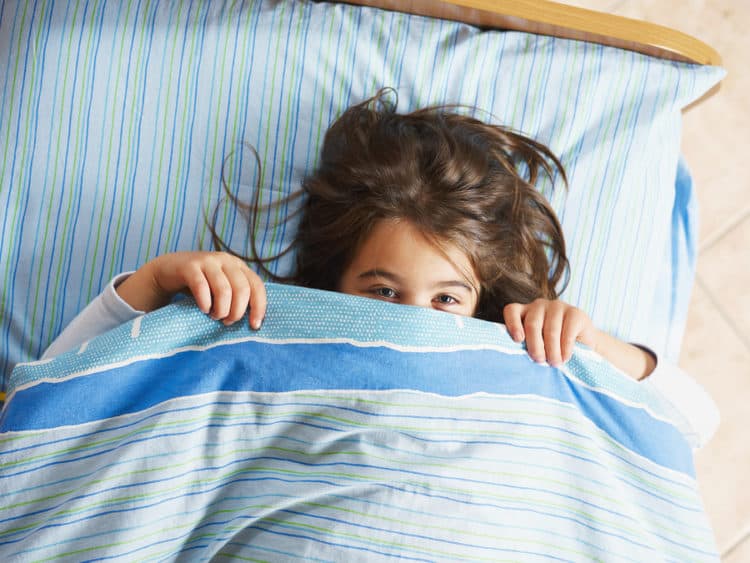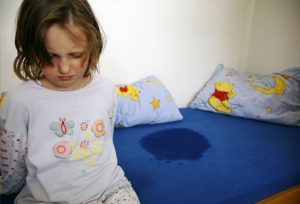Stages of diagnosis and treatment of bedwetting

Enuresis is most often a multifactorial problem. In order to understand the causes and help the child cope with it, the efforts and patience of parents and the participation of doctors from several specialties are required. Therefore, the medical center “XXI Century” has developed a program to help children with bedwetting, in which several specialists participate together (this is important!).
The algorithm of actions was developed with the heads of the urological and neurological departments, since the main doctors who treat patients with enuresis are urologists and neurologists. For parents, it does not matter which doctor to come to the appointment in the first place, since the problem is at the junction and consultation of both specialists will be required.
It would be more correct to call enuresis not an independent disease, but a symptom. A signal that some of the systems in the body does not work quite correctly. What is the value in this case of a clear, coordinated with all specialists, algorithm? Both doctors and patients’ parents understand the feasibility of a step-by-step examination plan, determining the causes, from the most probable to those that are quite rare.
Traditionally, since the problem is associated with the urinary system, more often they first turn to a urologist. The first consultation is always a long and very important conversation with parents about what enuresis is and how the examination will take place, what parents and the child will need to do at home. A urologist primarily excludes inflammatory causes and pathologies of the urinary system. For this, ultrasound diagnostics are performed and laboratory tests are prescribed.
The urologist must send for a consultation with a neurologist to assess the neurological status of the child. With hyperactivity, anxiety, increased emotionality and excitability, often already at the first stage, taking the prescribed drugs gives a positive effect. Also, the neurologist determines the muscle tone, the condition of the spine, decides on the advisability of prescribing manual therapy, osteopathy, massage.
In situations with secondary enuresis, that is, when there was a long period of dry nights, and then the child began to pee, and in some cases of primary enuresis, after the examination, the neurologist may recommend a child psychotherapist as the next step.
Another, seemingly not the most obvious connection, but, nevertheless, found in St. Petersburg children is not rare – enuresis and adenoids. If there are moments of hypoxia of the brain, this can affect the formation of the center of urination. The combination of enuresis, hypoxia and enlarged adenoids is an indication for ENT consultation and treatment or removal. And in this case, until normal breathing is established, all other measures will be ineffective.
The problem with the deficiency of a certain hormone, vasopressin, should be excluded, which is solved by taking the drug, and urination is normalized. Laboratory methods do not determine the lack of this hormone; a diary of urination, assessment of urine output and exclusion of an overactive bladder and the lack of effect from previous urotherapy and treatment by a neuropathologist play a key role in the decision on the appointment of treatment.
Next comes the examination and identification of violations that interfere with the control of the urination process. The neurologist prescribes electroencephalography (EEG), ultrasound of the brain. Urologist – non-invasive, that is, non-traumatic, without intervention inside the body, urodynamic studies: uroflowmetry with ENMG.
This test allows you to determine or exclude overactive pelvic floor muscles. During this test, the child with the attached sensors urinates into a special container. The device in the container evaluates the characteristics of the process, and the sensors register pulses from the muscles of the pelvic floor at this moment. Based on the data, graphs are formed, according to which the doctor draws conclusions and prescribes therapy. If the study confirms the hyperactivity of the pelvic floor muscles, biofeedback therapy may be prescribed. Biofeedback therapy is a technique that, with the help of an apparatus, teaches a child to control the pelvic floor muscles when urinating.
In difficult cases, when, after the examination and treatment, there is no pronounced positive dynamics, the next stage of diagnosis is connected, a complex urodynamic study (KUDI).
A few tips for parents or a practical part of homework to beat bedwetting.
The main thing to understand is that bedwetting can be successfully treated. According to our practical experience, in more than 90% of cases, with the interaction of doctors, the child and the parents, the problem can be solved. Sometimes, without even resorting to serious drug therapy, with the help of urotherapy – the formation of correct stereotypes of behavior, a slight correction of the emotional background.
Enuresis https://en.wikipedia.org/wiki/Enuresis is not a problem for parents, without the child’s participation, behavior and habits formation, it is difficult to expect the effectiveness of treatment. The center of urination is being formed, there are no children born with this ability. So this process can be controlled. Normally, by 4-5 years of age, the brain and nervous system are ready to control the process of urination at night. If a child of this age or older is peeing, it is not necessary to leave the diaper, or change the absorbent diapers without disturbing the child. On the contrary, you need to wake him up so that he himself changes and takes the laundry to the wash, fully realizes what is happening.
It is necessary to create a calendar of dry and wet nights, in which the child himself will celebrate the dry night with the sun. One should rejoice and reward for dry nights, but not scold for wet ones. The task of parents is not to succumb to emotions, to support the child, not to increase tension. The optimal position is not your fault, we will solve this problem together.
At the first appointment, the urologist will give you a form of a urination diary and explain how to fill it out. This is a very important part of the diagnosis, which gives the doctor an idea of how the bladder works, treat it responsibly. Sometimes, already from one urination diary, one can understand whether there is a problem with an overactive bladder or not, and, if there is, conduct a specific diagnosis and select therapy.